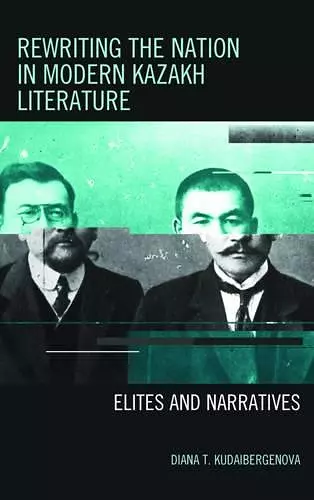Rewriting the Nation in Modern Kazakh Literature
Elites and Narratives
Format:Hardback
Publisher:Lexington Books
Published:3rd Feb '17
Currently unavailable, and unfortunately no date known when it will be back
This hardback is available in another edition too:
- Paperback£39.00(9781498528313)

Rewriting the Nation in Modern Kazakh Literature is a book about cultural transformations and trajectories of national imagination in modern Kazakhstan. The book is a much-needed critical introduction and a comprehensive survey of the Kazakh literary production and cultural discourses on the nation in the twentieth and twenty first centuries. In the absence of viable and open forums for discussion and in the turbulent moments of postcolonial and cultural transformation under the Soviets, the Kazakh writers and intellectuals widely engaged with the national identity, heritage and genealogy construction in literature. This active process of national canon construction and its constant re-writing throughout the twentieth century will inform the readers of the complex processes of cultural transformations in forms, genres and texts as well as demonstrating the genealogical development of the national narrative. The main focus of this book is on the cultural production of the nation. The focus is on the narratives of historical continuities produced in the literature and cultural discontinuities and inter-elite competition which inform such production. The development of Kazakh literary production is an extremely interesting yet underrepresented field of study. Since the late nineteenth century it saw a rapid transformation from the traditional oral to print literature. This brought an unprecedented shift in genres and texts production as well as a rapid growth of the ‘writing’ class – urban colonial and first generations of Soviet intelligentsia. Kazakh literary production became the flagman of republic’s rapid cultural modernization and prior to the World War II local publishing industry produced up to 6 million print copies a year. By the 1960s and 1970s – the golden era of Kazakh literature, the most read literary journal Juldyz sold 50,000 copies all over the country. Literature became the mass provider of knowledge about the past, the present and of the future of the country. Because “Kazakh readers were hungry to find out about their pre-Soviet past and its national glory” national writers competed in genres, styles and ways to write out the nation in prose, poems, essays and historical novels.
Rewriting the Nation in Modern Kazakh Literature offers a rare glimpse into the world of the ‘writers of the nation’ who, in pursuit of their elitist projects, shaped ‘total readership’ in Soviet Kazakhstan and inscribed the ideals of indigenous history and nationhood. While focused on research and mythology involved in these Soviet projects, it speaks volumes to broader issues and provides important insights to academic debates on totalitarianism, post-colonialism, and national imagination. -- Saulesh Yessenova, University of Calgary
Diana T. Kudaibergenova has written an important book that introduces modern Kazakh literature and issues of Kazakh identity to English-language audiences. She accomplishes this through a careful analysis of selected major works of Kazakh belles lettres. Her study provides a cogent analysis of the relation of works of successive generations of writers to one another and to the political context in which they worked. Readers of this book will be rewarded with an understanding of how Kazakh literati have conceived of and portrayed the history of the Kazakh people and its relevance to the eras in which they wrote. Dr. Kudaibergenova leads the reader up to the present and illustrates the complexity of Kazakhs’ and Kazakhstan’s identity in the post-Soviet era. -- William Fierman, Indiana University Bloomington
Impressively applying methods of cultural semiotics and the sociology of culture, Diana T. Kudaibergenova approaches the ideologies that have been accompanying the complex transformations of Kazakh national identity in a non-ideological manner, combining intimate familiarity with her subject with an objective perspective throughout. This renders her monograph a groundbreaking contribution to the study of modern Kazakh society, particularly regarding the ways in which literary texts shaped national discourses during the Soviet and post-Soviet periods. -- Peter Rollberg, George Washington University
ISBN: 9781498528290
Dimensions: 238mm x 158mm x 21mm
Weight: 581g
258 pages